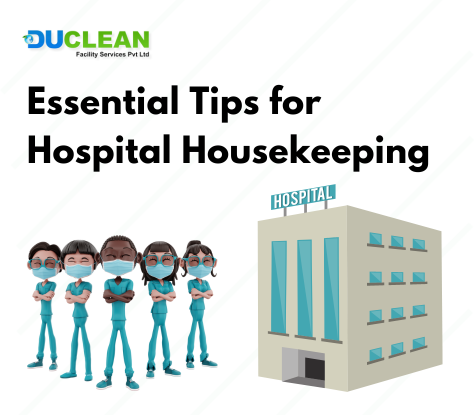Hospitals are the most vulnerable places where infection can grow and spread. This situation is harmful to the patients as well as the staff and visitors. Thus, effective and deep housekeeping in hospitals is significant. To keep a check on contingencies and to boost a healthy environment, the housekeeping department needs to be on its toes to tackle every situation for disinfecting, sanitizing, and waste management.
In this blog post, we have gathered essential tips for the housekeeping department to keep the hospital infection and disease-free.
10 Essential Tips for Effective Hospital Housekeeping
1. Deep Cleaning and Disinfecting
Deep cleaning and disinfecting processes should be done back-to-back with the housekeeping process. Cleaning the surface to remove dirt, debris, waste, and stains is part of the process because cleaning does not remove bacteria, which can lead to serious infections.
Disinfecting is the second step that ensures the extermination of the harmful bacteria. Use proper disinfecting liquids to mop the floors and spray on the hard-to-reach areas like door knobs, windows, and medical fixtures.
When cleaning and disinfection are done simultaneously, it ensures proper cleaning via dusting, mopping, and accurate disinfecting via disinfectants to reduce the risk of infections and diseases.
2. Pick Appropriate Cleaning Agents
Further, in the process of cleaning and disinfecting, choosing the right cleaning chemicals for disinfection is crucial. Considering the industrial standard, cleaners with a safety profile ensure proper disinfection with safeguards for the user and the patient.
Along with this, hospital housekeepers must use reusable cleaning cloths to encourage sustainability on the hospital premises and reduce the waste of single-use cleaning products.
3. Have PPE
Personal protective equipment is very potent in the process of housekeeping. To reduce the risk of exposure to harmful chemicals and cross-contamination from patient use of PPE is essential.
Gloves, masks, safety goggles, helmets, protective suits, aprons, and boots are some of the major items in the personal protective equipment that are necessary for housekeepers while carrying out their housekeeping duties.
4. Cleaning the High-Touch Areas
In any hospital housekeeping, the priority is to clean the high-touch surface. The frequently touched surfaces by the patients or visitors can lead to the residue of microorganisms. This situation can lead to cross-contamination on the hospital premises, which caters to the probelm of the spread of infection. Cleaning the highly touched areas is pivotal in the process of housekeeping to avoid any adverse situation.
5. First, clean the cleaner areas, then the dirtier ones.
While cleaning, the human tendency is to clean dirtier areas first, but in hospitals, it can create a massive chain of infection. Cleaning the dirtier areas, like bathrooms and toilets, and moving towards the cleaned areas can lead to cross-contamination.
To avoid this adverse situation, housekeepers must remember to clean the cleaner areas like patients’ rooms, operation rooms, OPDs, and corridors, after which cleaning the dirtier areas will eliminate any harmful microorganisms and bacteria in that place, thereby minimizing the risk of infection to the patients, staff, and visitors.
6. Air Purification is a Must
Reducing air pollution inside the premises is very necessary for hospital housekeeping. Air purification helps reduce airborne pathogens, enhances the air quality of the premises, and ensures the safety of patients, staff, and visitors. This measure is essential for immunocompromised patients by eliminating pollutants, bacteria, and odors.
Compliance with health regulations and high air quality to meet requirements and enhance patient recovery. Advanced air purification technologies, such as HEPA filters and UV light, protect healthcare workers by maintaining a safe work environment and improving overall healthcare quality and safety.
7. Control Cross-Contamination
It is the toughest job in the whole process of housekeeping in hospitals. The housekeeping staff has to get rid of the contaminants as soon as possible because the longer it gets, the more risky it gets for the patients, staff, and visitors. The use of proper disinfectant and standard equipment helps housekeepers eliminate pathogens to reduce the chances of cross-contamination.
8. Effective Waste Management
Waste management is another crucial aspect of this whole process. Hospitals create many types of waste, such as biohazardous, chemical, biodegradable, and non-biodegradable. All waste needs to be collected and segregated at the point of source and needs to be disposed of accordingly without creating any contamination or pollution. Proper and accurate waste management boosts a healthy environment, which helps the patient recover at a faster rate.
9. Right Use of Chemicals
Cleaning and disinfecting the hospital requires cleaning agents and chemicals, but opting for the right chemicals is essential. Chemicals can be harmful to staff and patients, so the use of accurate quantities and not going overboard with their use is very important. Hospitals should use chemicals that comply with the standards of skin safety with the highest level of cleaning agents for cleaning standards.
10. Cleaning the Laundry Regularly
Maintaining a healthy atmosphere and controlling the spread of illnesses in hospitals requires routine laundry cleaning. Sheets, gowns, and towels used in hospitals might carry viruses and germs that are hazardous. By getting rid of these impurities, proper laundry lowers the chance of hospital-acquired diseases. Additionally, fresh linens improve patient comfort and provide a more satisfying medical experience. Strict adherence to laundry procedures guarantees observance of health laws and guidelines, safeguarding patients and medical staff from possible contamination and cross-infection, and promoting general hospital safety and hygiene.
Conclusion
Hospitals are especially vulnerable to the development and transmission of illnesses, which puts patients, employees, and visitors in danger. Cleaning and keeping a place clean and healthy depend heavily on effective housekeeping. The important hospital housekeeping advice in this blog article included deep cleaning and disinfection, using the right cleaning products, donning personal protective equipment, paying attention to high-touch locations, and making sure laundry is cleaned regularly. Hospitals may drastically lower the danger of infection, guarantee adherence to health laws, and provide a secure, welcoming atmosphere that enhances patient recovery and the standard of care provided by their healthcare providers by following these guidelines.

